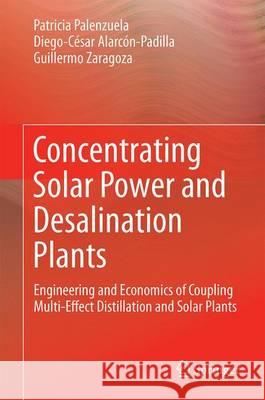Concentrating Solar Power and Desalination Plants: Engineering and Economics of Coupling Multi-Effect Distillation and Solar Plants » książka
Concentrating Solar Power and Desalination Plants: Engineering and Economics of Coupling Multi-Effect Distillation and Solar Plants
ISBN-13: 9783319205342 / Angielski / Twarda / 2015 / 172 str.
Concentrating Solar Power and Desalination Plants: Engineering and Economics of Coupling Multi-Effect Distillation and Solar Plants
ISBN-13: 9783319205342 / Angielski / Twarda / 2015 / 172 str.
(netto: 421,70 VAT: 5%)
Najniższa cena z 30 dni: 424,07
ok. 16-18 dni roboczych.
Darmowa dostawa!
This book provides a detailed examination of how two key concerns in many communities across the globe- power and water- can be simultaneously addressed through the coupling of Concentrating Solar Power and Desalination (CSP+D) plants. It undertakes a technological and economic evaluation of the integration of Multi-effect Distillation Plants into CSP plants based on Parabolic Trough solar collectors (PT-CSP+MED), as compared to independent water and power production through Reverse Osmosis unit connection to a CSP plant (CSP+RO). Through this compare and contrast method of analysis, the author establishes guidelines to assist readers in identifying cases wherein PT-CSP+MED systems provide greater benefits from a thermodynamic and economic point of view. The text outlines efficiencies and challenges derived from the combination of PT-CSP power generation with four different desalination plant scenarios, beginning with a description of the equations used in the modeling and validation of a pilot MED plant and followed by detailed thermodynamic analysis of several currently operating CSP+D systems. Comparative thermodynamic assessments are based on a sensitivity analysis from which the overall efficiency of the cogeneration system is determined. The author outlines all the equations used for the modeling of each component and includes 97 comparative tables obtained from the sensitivity analysis, showing the variation of the overall thermal efficiency of the CSP+D as a function of fundamental parameters of the cogeneration cycle, such as the specific electric consumption of the desalination plants, and the turbine outlet temperature of the power cycle. These findings are then placed in practical context through a complete thermo-economic analysis, which is carried out for two specific locations in the Middle East and Europe in order to identify the most practically and economically viable CSP+D system in each region as informed by actual operating conditions, meteorological data and real cost figures for each location.











